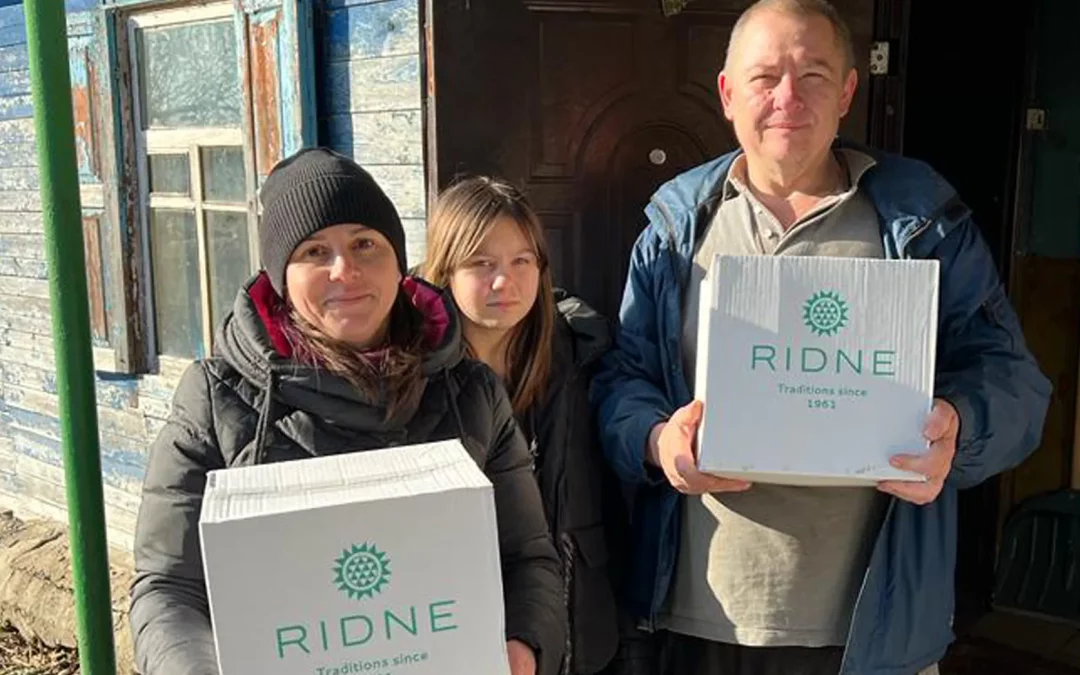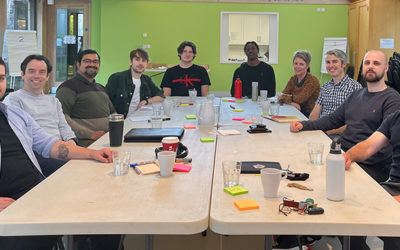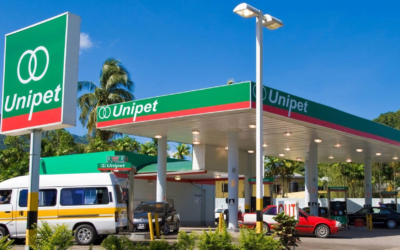If anyone reading this blog (particularly big supermarkets and retailers) and would like to stock ISO-certified, EU/UK/US quality-controlled, competitively priced Ukrainian products that will put real meaning to the E and the S in your ESG programmes, then let me know ASAP.
Ukrainians don’t want your charity; they want to compete with the best producers worldwide for your business and real economic sustainability during this tremendously challenging time. So, perhaps you could match their example by showing a real commitment to social impact and giving them a chance to bid as suppliers?
They really do have world-class produce, and some huge foundations are ready to help them scale and derisk their supply chain. And after the week I’ve just spent there, it is difficult to find an argument against buying Ukrainian.
What Real Resilience Looks Like: Redefining Aid, Trade and Impact the Ukrainian Way
This is not my first visit to Ukraine since the war began, yet the resilience and imagination of the Ukrainian people never cease to amaze me. I have just had one of the most fascinating and inspiring business trips of my life, and am returning even more convinced that we have more to learn from Ukraine’s attitude to building resilient and sustainable businesses than anywhere else.
I have spent the last week with the Ridne Food Consortium in Central and Eastern Ukraine, a fabulous group of farmers and food producers, who despite the enormous adversity they face due to the horrific and illegal aggression being forced upon them by Russian politicians, are increasing their production of high-quality Ukrainian food items, such as meat products, dairy products, pasta and pulses, oil and other staples. They are scaling up to meet both the internal demand created by the vast number of internally displaced people in Ukraine who are dependent on food aid and to export their excellent products to help rebuild and revitalise the Ukrainian Economy, bringing in essential foreign currency and creating thousands of jobs.
Having visited their farming and food production centres across Ukraine, there are two key learnings I will take away, and FuturePlus will work with Ridne on them to help them continue and grow their amazing work.
Firstly, having spent years in senior positions in the international aid sector, I was reminded of how much it still needs to improve if it is to really start to have an impact and avoid doing more harm than good in the long run. Most traditional aid programmes, including in Ukraine, still rely on either internationally donated food items or procuring the food they distribute to those that need it via large international contracts.
Whilst this might seem harmless and even generous, it can do a great deal of harm. Ukraine was and could still be one of the largest food-producing countries in the world. It is literally the definition of a breadbasket, and it makes damn good bread (and many other items) at that. By sending or buying food abroad, most of the precious aid money being donated by generous individuals and governments stays outside of Ukraine. It might help feed a Ukrainian family for a day, but it doesn’t create Ukrainian jobs, or help rebuild Ukrainian businesses or leave any lasting value. In fact, it undermines Ukraine.
Ridne, however, is working with some more enlightened partners like the Not-for-Profit Global Empowerment Mission, and The Howard Buffett Foundation as well as FuturePlus to help Ukrainian Food Producers scale up, to produce world-class essential foodstuffs, from tinned meat and fish to flour, pasta, oil, and other essentials inside Ukraine. They are now producing close to 40% of the food being distributed by some of the biggest international agencies, and their produce has provided close to 150 million meals in Ukraine so far.
More importantly, Ridne has kept factories open and even allowed them to expand their production. Many of them were close to bankruptcy after the war began, and their international trade dried up. They ensure that as much of your money as possible stays in Ukraine and actually help recipients become self-sufficient, productive and proud. They are reducing the need for aid by guaranteeing and creating thousands of jobs and livelihoods in farming communities, food processing companies, logistics firms, packaging companies, quality control firms and every other type of business involved in a modern food industry supply chain.
Furthermore, their world-class standards often exceed all the required sustainability, ISO and international production standards that we expect from highly developed agro-industry companies.
What is more impressive, however, is what they are now asking for help with. Their request to me was for us to stop just giving money to aid organisations to ‘help’ the Ukrainian people and instead to start buying their excellent products so they can help themselves.
Alongside a passionate commitment to working with FuturePlus to meet the highest standards of environmentally and socially sustainable food production, they are also wanting us to help them establish international markets for their fabulous products. As one food processing plant owner told me, ‘We are incredibly grateful for the aid you send and the help you have given, but we would rather have you as customers than charitable benefactors so we can rebuild our country’. I must say, this sentiment impressed me more than just about anything I have heard in 28 years of leading humanitarian programmes.
The other thing that really struck me on my visit, that I also think we can all learn from, was how genuinely Ridne and their partners have embraced working with FuturePlus to make sure they adopt the most sustainable social, environmental, and economic practices as they scale.
As one Ridne director put it ‘just because we are at war, it doesn’t mean we shouldn’t think about building a better future’. This is one of the most humbling things I have heard in a long time.
I spend a lot of time in rich western cities and communities, hearing financiers and business owners tell me that they would love to be more genuinely sustainable (not just tick box ESG compliant), but they have so many competing priorities. Hearing Ridne producers tell me that this is a priority as they believe it ensures their business will be more profitable for longer puts us all to shame a little.
One of the Ridne partners I spoke to, who was adamant that sustainability is essential to ensure his children’s and grandchildren’s economic future, has two sons on the front line fighting for all of our freedoms. That brings real perspective, I feel.
After 2.5 years of war, Ridne and their partners are still thinking about the future of their country and their economy. They want your trade and help to build self-sufficiency, not just your aid and sympathy.
I am leaving Ukraine both tremendously inspired and utterly humbled. But I will be relentlessly calling every large retailer and supplier in the UK from tomorrow, to see if they really want to put some substance behind their ESG claims, because I have a great proposal for them from FuturePlus.
If Ridne and their partners can put social and economic sustainability at the centre of their businesses, with all the challenges they face, then none of us can have any excuse not to do so as well.
And if you really want to help, don’t just give charity to Ukraine, buy Ukrainian – you know it makes sense: [email protected]
If anyone reading this blog (particularly big supermarkets and retailers) and would like to stock ISO-certified, EU/UK/US quality-controlled, competitively priced Ukrainian products that will put real meaning to the E and the S in your ESG programmes, then let me know ASAP.
Ukrainians don’t want your charity; they want to compete with the best producers worldwide for your business and real economic sustainability during this tremendously challenging time. So, perhaps you could match their example by showing a real commitment to social impact and giving them a chance to bid as suppliers?
They really do have world-class produce, and some huge foundations are ready to help them scale and derisk their supply chain. And after the week I’ve just spent there, it is difficult to find an argument against buying Ukrainian.
What Real Resilience Looks Like: Redefining Aid, Trade and Impact the Ukrainian Way
This is not my first visit to Ukraine since the war began, yet the resilience and imagination of the Ukrainian people never cease to amaze me. I have just had one of the most fascinating and inspiring business trips of my life, and am returning even more convinced that we have more to learn from Ukraine’s attitude to building resilient and sustainable businesses than anywhere else.
I have spent the last week with the Ridne Food Consortium in Central and Eastern Ukraine, a fabulous group of farmers and food producers, who despite the enormous adversity they face due to the horrific and illegal aggression being forced upon them by Russian politicians, are increasing their production of high-quality Ukrainian food items, such as meat products, dairy products, pasta and pulses, oil and other staples. They are scaling up to meet both the internal demand created by the vast number of internally displaced people in Ukraine who are dependent on food aid and to export their excellent products to help rebuild and revitalise the Ukrainian Economy, bringing in essential foreign currency and creating thousands of jobs.
Having visited their farming and food production centres across Ukraine, there are two key learnings I will take away, and FuturePlus will work with Ridne on them to help them continue and grow their amazing work.
Firstly, having spent years in senior positions in the international aid sector, I was reminded of how much it still needs to improve if it is to really start to have an impact and avoid doing more harm than good in the long run. Most traditional aid programmes, including in Ukraine, still rely on either internationally donated food items or procuring the food they distribute to those that need it via large international contracts.
Whilst this might seem harmless and even generous, it can do a great deal of harm. Ukraine was and could still be one of the largest food-producing countries in the world. It is literally the definition of a breadbasket, and it makes damn good bread (and many other items) at that. By sending or buying food abroad, most of the precious aid money being donated by generous individuals and governments stays outside of Ukraine. It might help feed a Ukrainian family for a day, but it doesn’t create Ukrainian jobs, or help rebuild Ukrainian businesses or leave any lasting value. In fact, it undermines Ukraine.
Ridne, however, is working with some more enlightened partners like the Not-for-Profit Global Empowerment Mission, and The Howard Buffett Foundation as well as FuturePlus to help Ukrainian Food Producers scale up, to produce world-class essential foodstuffs, from tinned meat and fish to flour, pasta, oil, and other essentials inside Ukraine. They are now producing close to 40% of the food being distributed by some of the biggest international agencies, and their produce has provided close to 150 million meals in Ukraine so far.
More importantly, Ridne has kept factories open and even allowed them to expand their production. Many of them were close to bankruptcy after the war began, and their international trade dried up. They ensure that as much of your money as possible stays in Ukraine and actually help recipients become self-sufficient, productive and proud. They are reducing the need for aid by guaranteeing and creating thousands of jobs and livelihoods in farming communities, food processing companies, logistics firms, packaging companies, quality control firms and every other type of business involved in a modern food industry supply chain.
Furthermore, their world-class standards often exceed all the required sustainability, ISO and international production standards that we expect from highly developed agro-industry companies.
What is more impressive, however, is what they are now asking for help with. Their request to me was for us to stop just giving money to aid organisations to ‘help’ the Ukrainian people and instead to start buying their excellent products so they can help themselves.
Alongside a passionate commitment to working with FuturePlus to meet the highest standards of environmentally and socially sustainable food production, they are also wanting us to help them establish international markets for their fabulous products. As one food processing plant owner told me, ‘We are incredibly grateful for the aid you send and the help you have given, but we would rather have you as customers than charitable benefactors so we can rebuild our country’. I must say, this sentiment impressed me more than just about anything I have heard in 28 years of leading humanitarian programmes.
The other thing that really struck me on my visit, that I also think we can all learn from, was how genuinely Ridne and their partners have embraced working with FuturePlus to make sure they adopt the most sustainable social, environmental, and economic practices as they scale.
As one Ridne director put it ‘just because we are at war, it doesn’t mean we shouldn’t think about building a better future’. This is one of the most humbling things I have heard in a long time.
I spend a lot of time in rich western cities and communities, hearing financiers and business owners tell me that they would love to be more genuinely sustainable (not just tick box ESG compliant), but they have so many competing priorities. Hearing Ridne producers tell me that this is a priority as they believe it ensures their business will be more profitable for longer puts us all to shame a little.
One of the Ridne partners I spoke to, who was adamant that sustainability is essential to ensure his children’s and grandchildren’s economic future, has two sons on the front line fighting for all of our freedoms. That brings real perspective, I feel.
After 2.5 years of war, Ridne and their partners are still thinking about the future of their country and their economy. They want your trade and help to build self-sufficiency, not just your aid and sympathy.
I am leaving Ukraine both tremendously inspired and utterly humbled. But I will be relentlessly calling every large retailer and supplier in the UK from tomorrow, to see if they really want to put some substance behind their ESG claims, because I have a great proposal for them from FuturePlus.
If Ridne and their partners can put social and economic sustainability at the centre of their businesses, with all the challenges they face, then none of us can have any excuse not to do so as well.
And if you really want to help, don’t just give charity to Ukraine, buy Ukrainian – you know it makes sense: [email protected]

IMPACT PROVEN THROUGH RESULTS
WE TURN ESG INTO
COMPETITIVE ADVANTAGE










































